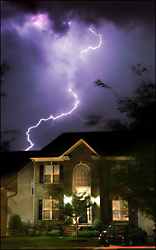 Summer is upon us. Summertime means barbeques and thunderstorms, but it’s best to keep them separate. Most of us have gas-fed barbeque grills, but we know to keep them outside. With thunderstorms, come lightning. For an unfortunate few whose homes contain corrugated stainless steel gas tubing (CSST), lightning will strike at or near their homes and energize the gas piping. As this happens, the energy from the lightning strike will burn a hole through this thin steel material, allowing pressurized flammable gas to escape. At the same time, the heat from the lightning strike will ignite the escaping gas. No one wants a barbeque grill inside their home.
Summer is upon us. Summertime means barbeques and thunderstorms, but it’s best to keep them separate. Most of us have gas-fed barbeque grills, but we know to keep them outside. With thunderstorms, come lightning. For an unfortunate few whose homes contain corrugated stainless steel gas tubing (CSST), lightning will strike at or near their homes and energize the gas piping. As this happens, the energy from the lightning strike will burn a hole through this thin steel material, allowing pressurized flammable gas to escape. At the same time, the heat from the lightning strike will ignite the escaping gas. No one wants a barbeque grill inside their home.
Unlike last year, this summer has not yet to featured many powerful thunder storms. However, in the few storms that have occurred across the country, we are seeing CSST losses and these losses have recovery potential. Review of several contractor message boards across the country reveals that contractors using CSST are concerned. Many have reverted to using black iron pipe. For those who continue to use the product, they certainly risk liability for continuing to use a product that they now know has a track record for failing under expected conditions. Simply relying on the manufacturers’ claim that the product is safe may not be enough to avoid this liability.
Through the years, the manufacturer’s installation instructions have changed and the concepts of grounding and bonding have become more significant. Similarly, the newest codes have entire sections devoted how to bond CSST. The reason these newest sections are devoted to only CSST is that other types of gas piping simply do not have same problems handling lightning. Yet, in homes with bonding and grounding, these losses are occurring. These losses raise the issue of whether bonding and grounding is enough. Or, perhaps, the gas lines, while bonded, were not bonded effectively. What constitutes an effective bond continues to change as much as anything. It would not be much of a surprise if bonding requirements change again in the next round of code updates. In short, all this means is that there are a lot of new homes out there that have gas lines in them that may not be safe and neither the contractors or the CSST industry are alerting the owners of these homes to the problems they have created.
Nobody wants an indoor barbeque. It’s just not safe.



